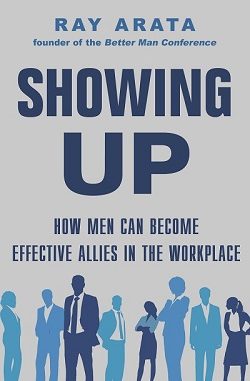
Ray Arata Author of Showing Up: How Men Can Become Effective Allies in the Workplace comes across as one of those congenial guys you’d want to grab a beer with. Someone who is the best possible version of a man, in the twenty-first century. Complete with timely, woke, and holistic views on what it is to be a (good) man in a twenty-first century context, and the accomplished chops to show for it. He’s the co-founder of the think tank and social justice organization Better Man Leadership Group, working tirelessly to help turn the conversation about gender inequality and all that entails onto its head.
ABOUT THE AUTHOR: www.rayarata.com/
As far as Arata is concerned, the process of overturning toxic male privilege and toxic masculinity all in all is simple to articulate. The process enacted to ensure the actual, conceptual outcome is the tricky part. Not that the individual steps taken are anything revolutionary, but because there are no straight answers right away. To commit one’s self to ensuring change is a lifelong journey, the kind of thing that will require a healthy and objective sense of selflessness along with a willingness to admit fault. It’s not what the often maligned rhetoric literally entails. No one expects people (particularly men) to get a perfect score on take one. But it’s the willingness to unpack the ingredients negating that hypothetical, perfect score, along with a willingness to hear the impact of those negating ingredients, leading the way to a better future. “It’s time to update your man cards and align to your new insight to what it means to be a man—one who values inclusivity and diversity and is an ally to those around us.
BETTER MAN LEADERSHIP GROUP: bettermanleadership.com/
This is where the rubber meets the road,” Arata states. It’s not a shame-fest, he elaborates, as much as it is merely a call to wake up. No doubt such revelatory actions and reboots were what helped shake up movements like the suffragettes, Roe v. Wade, and even support for laws like the Violence Against Women Act introduced by President Joe Biden in 1994. The deconstruction of what used to be everyday sexist, social and professional mores is merely the next step in the realization of a more just world. The difference is, the origins of such a revolution lie within you – particularly if ‘you’ in this context are a man.
This kind of extensive introspection will help change everything – both from the gargantuan obvious to the insidious subtle. “Talking like a better ally doesn’t mean being aggressive, dominating, or belittling. Instead, it means being inclusive, patient, and unbiased. This requires, first and foremost, that we consciously think like an ally so we can communicate like one,” Arata writes in this vein. He uses this introductory paragraph to subsequently jump into a study of the age-old mansplaining. “Ask yourself, why do I feel the need to explain this when I haven’t been asked to do so?
AMAZON: www.amazon.com/Showing-Up-Become-Effective-Workplace/dp/1635769116
Since women have as much knowledge as men, you only need to offer your knowledge when you are asked to do so,” he says. “If you see this behavior happen in meetings or elsewhere in your workplace or organization, take a moment to evaluate. Did the woman ask for the explanation? If not, check in and ask her if any explanation was needed. Let her tell you. You can pull the man aside later and explain what you observed, why his behavior was inappropriate, and how it impacts women. Again, being a good ally means calling out behavior when you see it.”
Clay Burton
